This flyer includes information on the Commission’s resources on food, nutrition and dining. We encourage providers to print and hand it out to their staff and make copies available at their workplace.
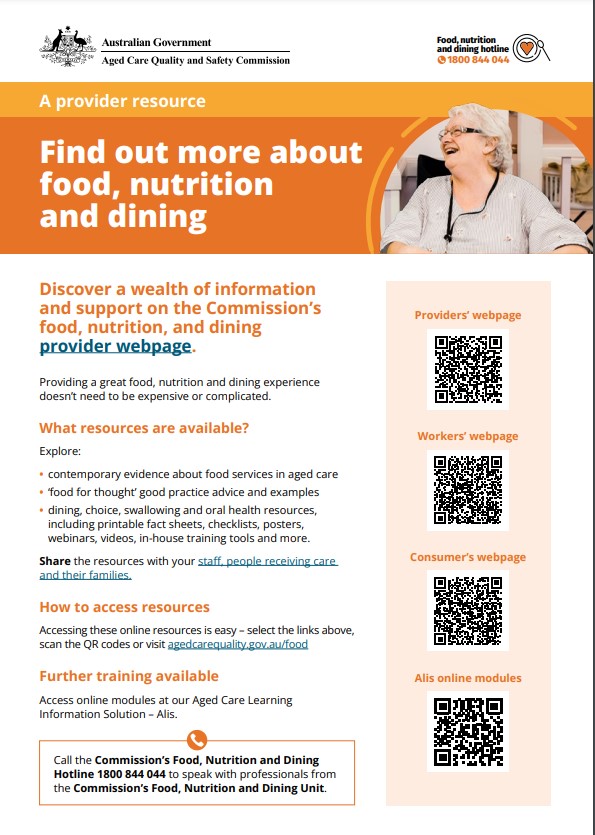
We visit aged care services as part of our role as the national regulator. Visits are an opportunity for us to work with providers to make sure older people are getting the best care possible.
This flyer explains what you can expect when we visit, including:
- what happens we when visit
- what you can expect from us
- what can you do to ensure a successful visit.

This handy checklist will help providers and workers understand their obligations under the Strengthened Standards and will also provide links to other resources on the Quality Standards.
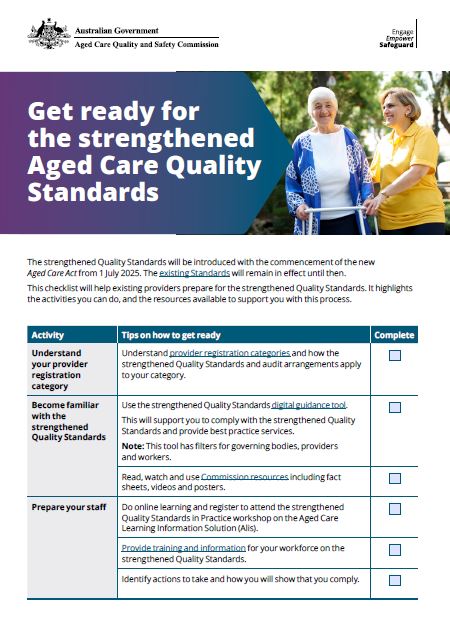
We have released a suite of fact sheets to help providers, aged care workers, and other stakeholders understand the new strengthened Quality Standards and their obligations in meeting them .
The strengthened Quality Standards will come into effect in line with the commencement of the new Aged Care Act.
This fact sheet is a quick reference guide which gives providers an overview of why there are different registration categories, what this means for them in practice, and how they can support your workers.

You need to have governance systems and processes to make sure your aged care workers can work in aged care.
This fact sheet explains a provider’s responsibilities for:
- screening workers
- preventing breaches to banning orders.
This resource may refer to information that will be updated from 1 July 2025 to align with the new Aged Care Act and Quality Standards.
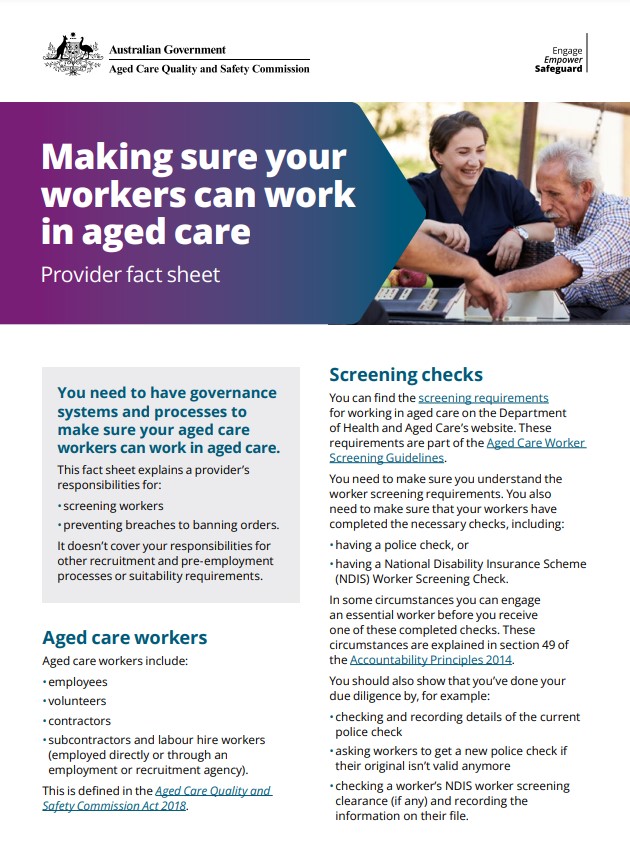
This fact sheet explains the role of residential aged care providers in providing access to voluntary assisted dying (VAD) in their service. We explain their responsibilities and obligations when a person in their care is thinking about, or wants to access, voluntary assisted dying.
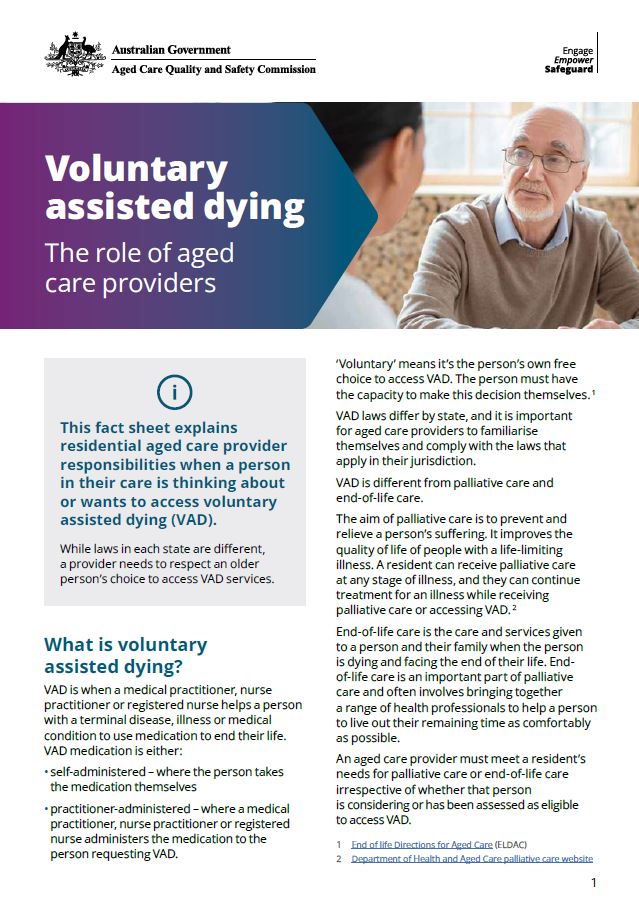
We have released a suite of fact sheets to help providers, aged care workers, and other stakeholders understand the new strengthened Quality Standards and their obligations in meeting them .
The strengthened Quality Standards will come into effect in line with the commencement of the new Aged Care Act.
Strengthened Quality Standard 1 underpins the way providers and staff should treat older people. It explains how important it is to understand that each older person is unique and has a different life story.
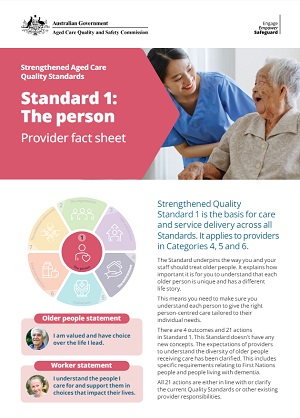
We have released a suite of fact sheets to help providers, aged care workers, and other stakeholders understand the new strengthened Quality Standards and their obligations in meeting them .
The strengthened Quality Standards will come into effect in line with the commencement of the new Aged Care Act.
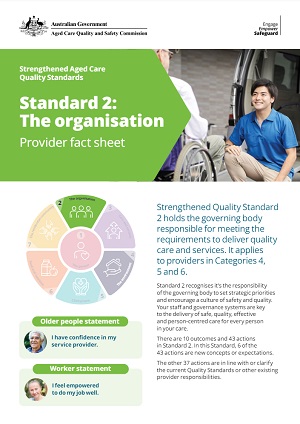
We have released a suite of fact sheets to help providers, aged care workers, and other stakeholders understand the new strengthened Quality Standards and their obligations in meeting them .
The strengthened Quality Standards will come into effect in line with the commencement of the new Aged Care Act.
Strengthened Quality Standard 3 is about the way providers tailor care and services to each person. It's important to understand that the older person has the right to take risks and you need to plan care to support this.
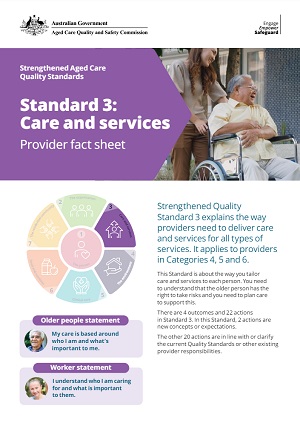
We have released a suite of fact sheets to help providers, aged care workers, and other stakeholders understand the new strengthened Quality Standards and their obligations in meeting them .
The strengthened Quality Standards will come into effect in line with the commencement of the new Aged Care Act.
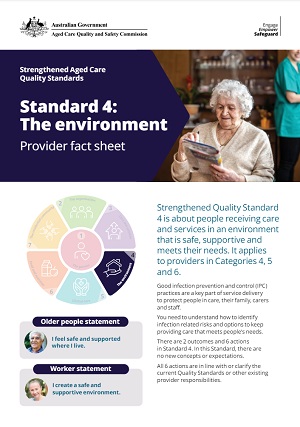
We have released a suite of fact sheets to help providers, aged care workers, and other stakeholders understand the new strengthened Quality Standards and their obligations in meeting them .
The strengthened Quality Standards will come into effect in line with the commencement of the new Aged Care Act.
Strengthened Quality Standard 5 describes the responsibilities of providers to deliver safe and quality clinical care. Good clinical care improves a person’s quality of life, independence, confidence and their feeling of purpose in daily life.
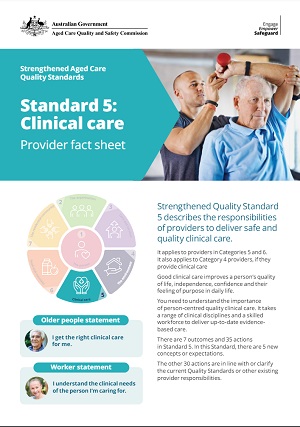
We have released a suite of fact sheets to help providers, aged care workers, and other stakeholders understand the new strengthened Quality Standards and their obligations in meeting them .
The strengthened Quality Standards will come into effect in line with the commencement of the new Aged Care Act.
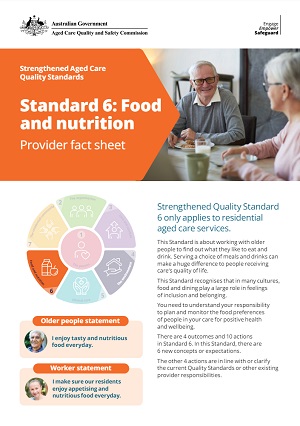
We have released a suite of fact sheets to help providers, aged care workers, and other stakeholders understand the new strengthened Quality Standards and their obligations in meeting them .
The strengthened Quality Standards will come into effect in line with the commencement of the new Aged Care Act.
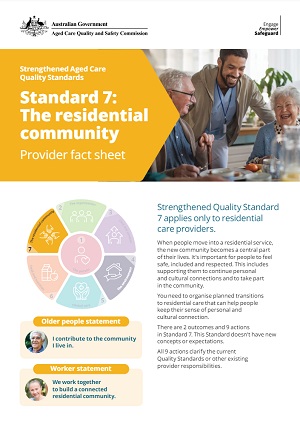
Have your say and help shape the future of aged care.

This fact sheet explains what you can do if you have been overcharged a refundable accommodation deposit (RAD) or daily accommodation payment (DAP) by your provider.

The Prudential Standards contained in the Aged Care Act 1997 (Act) and the Fees and Payments Principles 2014 (No. 2) detail your responsibilities for the use and management of your residents' refundable accommodation deposits (RADs).
Section 52G-3 of the Act states that the Minister for Aged Care may set a maximum amount of accommodation deposit. Currently, this maximum amount is $550,000 as a RAD (or the equivalent Daily Accommodation Payment (DAP)).

This fact sheet explains the benefits, processes and outcomes of home care pricing audits.
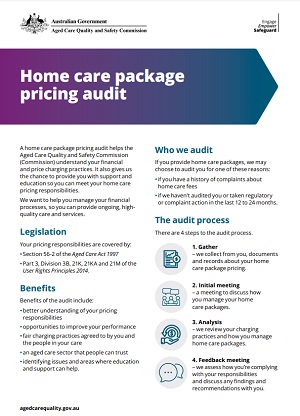
From 1 July 2023, residential aged care facilities across Australia must have a registered nurse (RN) onsite and on duty 24 hours a day, 7 days a week (24/7 RN responsibility) unless they have an exemption. This fact sheet provides information on alternative care arrangements to meet this requirement.

A fact sheet that informs providers of their governing body membership requirements.

A factsheet introducing providers to prudential audits; a mandatory activity the Commission undertakes with providers to measure and support their performance against the Prudential Standards.








